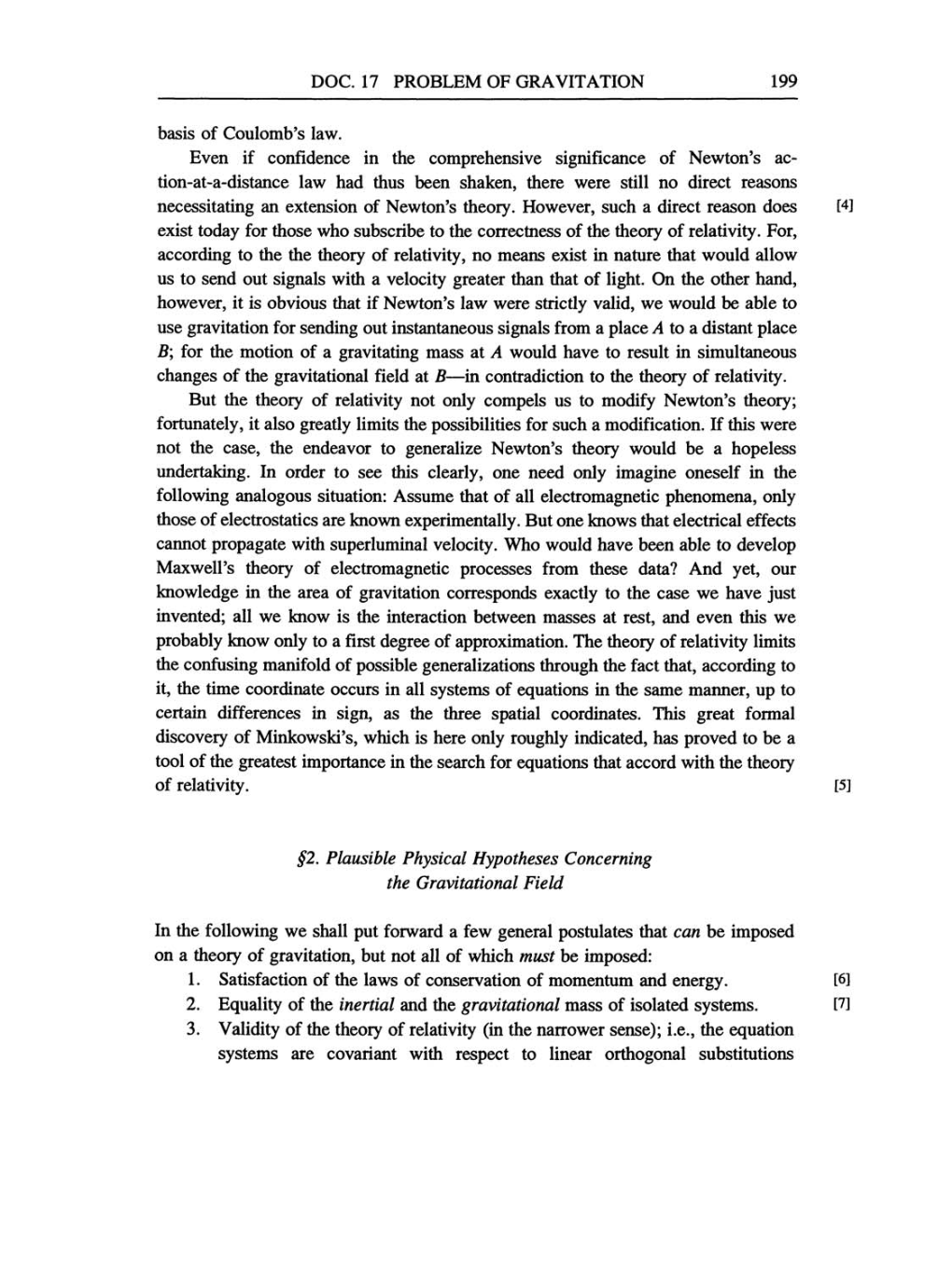DOC.
17
PROBLEM
OF
GRAVITATION
199
basis of
Coulomb's
law.
Even
if
confidence in the
comprehensive significance
of Newton's
ac-
tion-at-a-distance law
had thus been
shaken,
there
were
still
no
direct
reasons
necessitating
an
extension of Newton's
theory. However,
such
a
direct
reason
does
[4]
exist
today
for those who subscribe
to
the
correctness
of the
theory
of
relativity.
For,
according
to
the
the
theory
of
relativity, no means
exist in
nature
that would allow
us
to
send out
signals
with
a
velocity
greater
than that of
light.
On the other
hand,
however,
it
is obvious that
if
Newton's law
were
strictly
valid,
we
would be able
to
use
gravitation
for
sending
out
instantaneous
signals
from
a
place A
to
a
distant
place
B;
for the
motion
of
a gravitating mass
at
A
would have
to
result in simultaneous
changes
of
the
gravitational
field
at
B-in
contradiction
to
the
theory
of
relativity.
But
the
theory
of
relativity
not
only compels
us
to
modify
Newton's
theory;
fortunately,
it also
greatly
limits the
possibilities
for such
a
modification. If this
were
not
the
case,
the endeavor
to
generalize
Newton's
theory
would be
a
hopeless
undertaking.
In order
to
see
this
clearly,
one
need
only imagine
oneself in the
following analogous
situation: Assume that
of
all
electromagnetic phenomena, only
those of electrostatics
are
known
experimentally.
But
one
knows that electrical effects
cannot
propagate
with
superluminal velocity.
Who would have been able
to
develop
Maxwell's
theory
of
electromagnetic processes
from these data? And
yet, our
knowledge
in the
area
of
gravitation corresponds exactly
to
the
case we
have
just
invented;
all
we
know is the interaction between
masses
at rest,
and
even
this
we
probably
know
only
to
a
first
degree
of
approximation.
The
theory
of
relativity
limits
the
confusing
manifold of
possible
generalizations through
the fact
that,
according
to
it,
the time
coordinate
occurs
in all
systems
of
equations
in the
same
manner, up
to
certain differences in
sign, as
the three
spatial
coordinates. This
great
formal
discovery
of
Minkowski's,
which
is
here
only
roughly
indicated,
has
proved
to
be
a
tool
of
the
greatest importance
in the search for
equations
that accord with the
theory
of
relativity.
[5]
§2.
Plausible
Physical Hypotheses Concerning
the Gravitational Field
In
the
following
we
shall
put
forward
a
few
general postulates
that
can
be
imposed
on a theory
of
gravitation,
but
not
all of which
must
be
imposed:
1.
Satisfaction of the
laws
of
conservation of
momentum
and
energy. [6]
2.
Equality
of
the inertial and the
gravitational
mass
of isolated
systems. [7]
3.
Validity
of the
theory
of
relativity (in
the
narrower
sense); i.e.,
the
equation
systems
are
covariant with
respect
to
linear
orthogonal
substitutions
